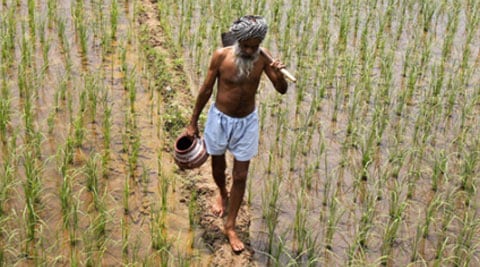Farmer Suicide Threat has taken a controversial turn in Rajasthan, where a farmer was asked to pay ₹9.9 lakh for the deployment of police security to prevent him from committing suicide. This incident, which unfolded in Jhunjhunu district, stems from the farmer’s protest against the non-payment of land compensation. The notice, which detailed the deployment of 99 police personnel, has sparked outrage as the farmer claims he never requested such security and is now being unjustly charged.
The Farmer’s Protest And Suicide Threat
The farmer, who remains unnamed in the initial reports, had reportedly threatened to take his own life due to delays in receiving compensation for his land. Land acquisition and delayed payments have long been a contentious issue in rural India, often leaving farmers in financial distress. In this case, the farmer’s drastic step was an attempt to draw attention to his plight and the alleged negligence of authorities in resolving his grievances.
Focus On The Farmer Suicide Threat
The controversy escalated when the district police deployed nearly 99 personnel to ensure the farmer did not harm himself. According to the farmer, he had no say in this arrangement but is now being charged a hefty sum of ₹9.9 lakh for the service. This move has drawn widespread criticism, with many questioning the logic and fairness of imposing such a financial burden on a farmer already struggling to make ends meet.
Land Compensation Issues In Rural India
- Persistent Delays: Land acquisition often leads to prolonged legal and bureaucratic hurdles, delaying rightful compensation for farmers.
- Inadequate Valuation: Farmers frequently allege that the compensation offered for their land is far below market rates, leaving them financially vulnerable.
- Lack Of Transparency: The absence of clear guidelines and frequent political interference exacerbate the challenges faced by affected landowners.
In this particular case, the farmer’s frustration with the system highlights these systemic flaws. His protest was a desperate call for attention to a problem that affects thousands of rural families across the country.
Legal And Ethical Questions
The ₹9.9 lakh charge for police security has raised significant legal and ethical concerns:
- Voluntary Deployment Or Imposition? The farmer insists that the security was deployed without his consent, making the charge seem arbitrary and punitive.
- Burden Of Cost: Critics argue that it is unfair to place the financial burden of public services, such as police protection, on an individual, especially when the individual is already in distress.
- Accountability Of Authorities: The incident raises questions about the role of government officials and the police in addressing citizens’ grievances effectively and compassionately.

Historical Precedents
This is not the first instance where state actions have clashed with the interests of farmers:
- Andhra Pradesh 2011: Farmers protesting against inadequate compensation for their land were arrested en masse, sparking nationwide criticism.
- Madhya Pradesh 2017: Police fired on agitating farmers demanding better prices for their crops, resulting in several deaths and widespread unrest.
- Punjab 2021: Farmers protesting against land acquisition for a highway project faced legal notices and financial penalties for blocking roads.
These examples underline the recurring tension between farmers and authorities, often fueled by a lack of dialogue and mutual understanding.
Public Outrage
The Farmer Suicide Threat case has ignited debates on social media and among activists. Many have condemned the decision to charge the farmer for security, calling it insensitive and indicative of the government’s apathy towards farmers’ issues. “A farmer threatens suicide because of non-payment, and instead of resolving his problem, he is handed a ₹9.9 lakh bill. Is this justice?” one Twitter user wrote.
Others have called for systemic reforms to prevent such incidents in the future. “The government needs to address the root cause—delayed land compensation—and not just focus on damage control,” said a farmer’s rights activist.
The Path Forward
The Jhunjhunu case underscores the urgent need for reforms in how authorities handle farmer grievances. Key steps include:
- Timely Compensation: Streamlining the land acquisition process to ensure prompt and fair compensation.
- Mental Health Support: Providing counseling and support to farmers facing extreme distress to prevent suicidal tendencies.
- Transparent Governance: Improving communication and transparency between farmers and government agencies.
- Legal Safeguards: Implementing measures to protect farmers from arbitrary charges and ensuring accountability in government actions.
This incident should serve as a wake-up call for policymakers to address the deeper issues plaguing rural India, rather than merely responding to symptoms of systemic failures.

